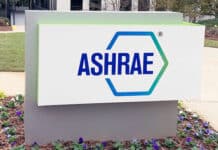
By Dr. Janet E. Stout
Facility managers have a plan for almost everything. You plan for fires, power outages and hurricanes, because when emergency strikes you know it’s better to be prepared. But there’s one crisis you probably haven’t planned for that’s more common than you think: Legionnaires’ disease.
When a single case of Legionnaires’ disease pneumonia is thought to have come from your building, all hell breaks loose. The health department is at your door along with the news media. All use of your water system halts—no drinking, no showering, or bathing. Extensive testing of your water for Legionella bacteria is required by the health department and emergency disinfection will have to happen in the next 48 hours. The health department will also recommend that you hire a consultant with Legionella expertise.
Many people are unprepared for this emergency because they tell themselves that it won’t happen to them and their building. Did you know that about 50% of large buildings are positive for the bacteria Legionella? When the bacteria go from the water into the lungs of a susceptible person, disease strikes. Conditions such as smoking, diabetes, lung disease and age can increase the risk of illness. When you think about that, it is more likely than not that Legionella could darken your door. The only sure way to know for sure if Legionella is a threat in your facility is to test. Thankfully, those tests are quick and relatively inexpensive if conducted by the right lab.
What Is Legionnaires’ Disease?
Legionnaires’ Disease is also a highly litigated and highly attention-grabbing disease. The CDC only receives about 1,000 reports of the disease a year (although everyone including the CDC recognizes that this statistic drastically undercounts the true number of cases.) And yet a quick search shows how relentlessly the media covers Legionella outbreaks. Legionnaires’ Disease is dangerous and deceptive at the same time. The disease causes a particularly serious form of pneumonia, yet it is difficult to identify Legionella as the culprit in patients. By the time an outbreak is detected there are often multiple severe cases which are easily traced back to the point of infection, leaving the afflicted and the public to wonder why steps weren’t taken to address the issue given the relative ease with which Legionella can be detected and treated.
Testing For Legionella
Proactive, routine testing for Legionella in your water system is the only way to guarantee that the health of your workers and clients and the reputation of your facility are protected. Hospitals and other medical or care facilities should be the first in line to test for Legionella, since the populations they serve are most at risk to Legionnaires’ Disease—the risk of death from Legionella is as high as 25-30% in those settings—but Legionella’s victims aren’t restricted just to healthcare facilities. Paging through the headlines of Legionella coverage reveals stories of the disease rearing its head in hotels, commercial property, campgrounds, conference centers, cruise ships, and more. Any facility with a water system is subject to the risks of Legionella and other waterborne pathogens.
Testing for Legionella is relatively easy and inexpensive, particularly when compared to the costs and headache of dealing with an outbreak and the ensuing litigation. Just 10-12 samples taken from access points throughout your water system like fountains and faucets, hot water tanks and recirculation lines can tell you whether your facility is safe from Legionella or if a treatment plan needs to be put in place. Testing by an accredited environmental laboratory costs just $100 per test. Cost conscious facility managers can reap savings by bundling tests for other common waterborne pathogens like Pseudomonas and nontuberculous mycobacteria, which combined with Legionella cost our national healthcare system roughly $2.4 billion each year. If Legionella is detected, there are treatment plans available to rid your facility of Legionella, supported by more testing to make sure the threat is really gone.
The best time to test for and treat Legionella is before it ever gets a chance to do harm. Organizations like the American Society of Heating, Refrigeration and Air-Conditioning Engineers (ASHRAE), the CDC, CMS, and the Joint Commission recommend facilities perform a Legionella risk assessment and have a water safety and management plan in place. The U.S. runs far behind the rest of the world in regulating water management best practices for Legionella by leaving testing up to the discretion of facilities. But six states have introduced legislation requiring certain facilities to test for Legionella, putting us closer to our goal of Ending Legionnaires’ Disease. More and more medical facilities are getting proactive, with 10% of SNFs and 30% of acute care facilities now testing for Legionella and I’m hopeful that more will soon join them.
Mitigating Waterborne Pathogens
In the meantime, there are other steps facilities can take to manage their risk of waterborne pathogens. Facility executives should consider adding a certified water management specialist to their teams. Barring that, the American Society of Sanitary Engineers has developed the first professional qualifications standard (Standard 12080) for Legionella Water Safety and Management Specialists. Finally, all facilities should look to ASHRAE’s Standard 188 and Guideline 12-2020 for guidance on the prevention and management of Legionella in their facilities.
Approach the Legionella threat like any other and be prepared for this emergency. If you don’t have an ASHRAE Standard 188 compliant water safety and management plan, develop one now. Pre-approve vendors for bottled water, point-of-use filters, water treatment and emergency disinfection services, Legionella laboratory testing, consultation services and more. As they say, fortune favors the prepared.
 Dr. Stout is executive V.P. and founder of Special Pathogens Laboratory, A Pace Laboratory and research associate professor at the University of Pittsburgh Swanson School of Engineering in the Department of Civil and Environmental Engineering. An infectious disease microbiologist, Dr. Stout is recognized worldwide for pioneering research in Legionella. Her expertise includes detection, prevention and control strategies for Legionnaires’ disease in building water systems. She advances the mission to End Legionnaires’ disease by speaking and serving on numerous industry committees, including the ASHRAE Legionella standard SSPC 188, Guideline 12-2020 and Proposed Standard 514. Dr. Stout initiated the development of the first professional qualifications standard, the ASSE Standard 12080 Professional Qualifications Standard for Legionella Water Safety and Management Personnel, and teaches the first, virtual online certification education course certifying more than 500 professionals to date.
Dr. Stout is executive V.P. and founder of Special Pathogens Laboratory, A Pace Laboratory and research associate professor at the University of Pittsburgh Swanson School of Engineering in the Department of Civil and Environmental Engineering. An infectious disease microbiologist, Dr. Stout is recognized worldwide for pioneering research in Legionella. Her expertise includes detection, prevention and control strategies for Legionnaires’ disease in building water systems. She advances the mission to End Legionnaires’ disease by speaking and serving on numerous industry committees, including the ASHRAE Legionella standard SSPC 188, Guideline 12-2020 and Proposed Standard 514. Dr. Stout initiated the development of the first professional qualifications standard, the ASSE Standard 12080 Professional Qualifications Standard for Legionella Water Safety and Management Personnel, and teaches the first, virtual online certification education course certifying more than 500 professionals to date.



















![[VIDEO] Collect Asset Data at the Speed of Walking a Building](https://facilityexecutive.com/wp-content/uploads/2024/02/maxresdefault-324x160.jpg)